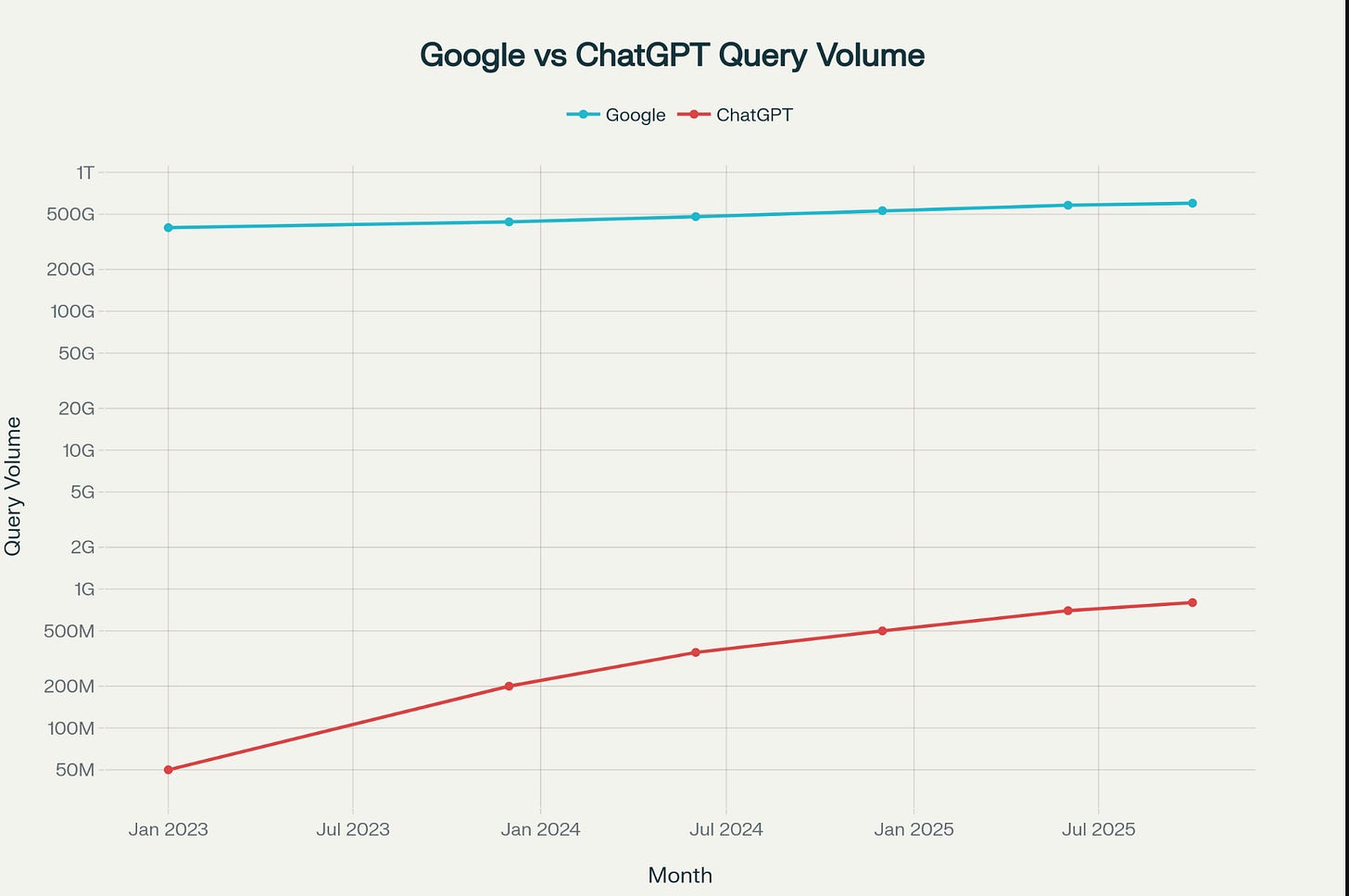When Evolution Beats Revolution
What Google vs ChatGPT Teaches About Category Strategy
When ChatGPT launched in late 2022, the tech world collectively panicked about Google. I did too.
The narrative was obvious: conversational AI would kill keyword search. Google needed to pivot immediately or die.
Two years later, here’s what actually happened:
Google went from 400 billion to 600 billion monthly queries. 200 billion!!! ChatGPT grew from 50 million to 800 million. Both winning. Both growing. Not competing splitting the market.
The Realisation That Changed My Mind
I caught myself the other day. Someone asked a question and I said “Google it.” But in my head, I wasn’t thinking about clicking through web pages anymore. I expected to see the answer right there, at the top.
Google changed my expectations without me noticing. They didn’t force a new behaviour - they evolved the one I already had.
And it clicked.
Google wasn’t defending against ChatGPT. They were letting ChatGPT do the hard work of training the market on AI answers, then positioning themselves as the convenient option for their use case.
Two Paths to Category Dominance
The perfect examples of the two fundamental strategies in category design.
Category Creation. ChatGPT positioned itself as conversational AI for deep exploration, and others followed their path.
Category Defence. When you own the behavior, you evolve it rather than abandon it. Google took search and added AI-powered answers.
(Yes, Google also launched Gemini to compete directly with ChatGPT. But their real win has been the defence strategy - evolving search with AI Overviews, not trying to replace it with a chatbot.)
The mistake most companies make is picking the wrong strategy for their position.
The Pressure Google Faced
ChatGPT became the fastest-growing product ever. Every publication wrote Google’s obituary. The stock price took hits. When over $200 billion in revenue is at stake, the urge to panic-ship something is overwhelming.
But they waited. They let ChatGPT normalise AI-generated answers, train users to trust AI responses, take all the early adoption risk, and prove the concept at scale.
Then they made their move: AI Overviews. Not a separate tool. Not a new behavior. Just enhanced search. That strategic patience when billions are at stake? That’s category defense mastery.
The Psychological Shift
Google rewired our expectations without us realising it.
The behavioural psychology is clever. You perform the same physical action - typing in a search bar. You see the same interface. But your expectation changed from getting a list of links to seeing an immediate answer. That quicker reward means the habit reinforces faster.
They kept the search behaviour intact but upgraded what “search” means in our brains. I hear more and more people saying “Google it” but meaning “see the answer immediately,” not “find relevant websites.”
The phrase stayed the same. The expectation evolved.
Why Both Are Winning
Search didn’t shift to one model. It split into two lanes.
Google owns quick retrieval - what time does Sainsbury’s close, tomorrow’s weather, how to remove a wine stain. Speed and convenience.
ChatGPT owns deep exploration - explain quantum computing, plan my Italy trip, brainstorm startup ideas. Depth and iteration.
When people use ChatGPT Search, queries drop to 4.2 words - Google-length. They’re searching, not chatting. The markets aren’t converging. They’re specialising.
The Two Strategies
If you’re the incumbent → defend by evolving what you own. Your behavioural debt is your moat. Don’t disrupt yourself.
If you’re the challenger → create a new category. Build from zero with no constraints. Let the incumbent keep their users - you want different users.
Google had 5 billion users with 20 years of trained behaviour. They couldn’t retrain everyone. That constraint forced clarity - enhance search, don’t replace it.
ChatGPT had zero users, zero constraints. They could build whatever made sense for conversational exploration.
Neither strategy is better. They’re just different games that different positions demand.
The Lesson
Evolution beats revolution when you own the behaviour. Revolution beats evolution when you don’t.
And often the hardest part isn’t choosing the strategy. It’s having the guts to commit when everyone thinks you’re wrong.
Google resisted the ChatGPT trend. They had strategic patience when the pressure was enormous. That restraint - that refusal to panic - separates category thinking from reactive competition.
Do you own the behaviour in your market? If yes, defend it.
If no, go and create something new. Markets split more often than they shift. Find your lane and commit.
Love,
Stef



